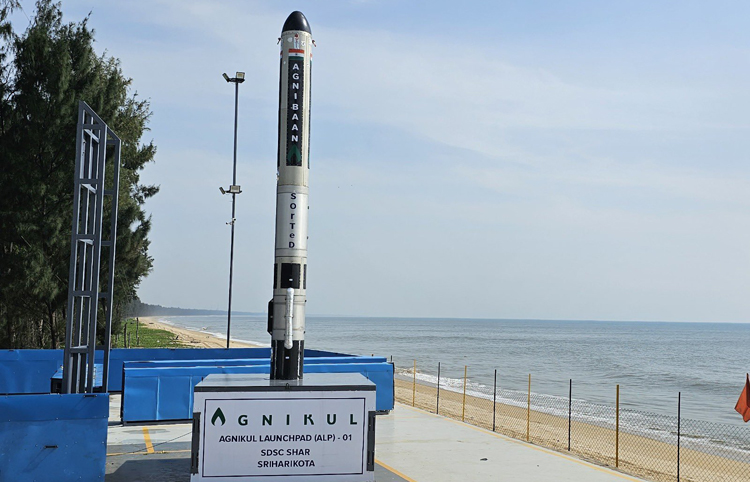The historic inaugural flight of Agnikul demonstrated indigenous technologies, gathered crucial data, and ensured optimal functioning of systems for the orbital launch vehicle 'Agnibaan' in the future.
 |
The Author is Former Director General of Information Systems and A Special Forces Veteran, Indian Army |

THE SUCCESSFUL LAUNCH OF AGNIBAAN ROCKET POWERED BY WORLD'S FIRST SINGLE-PIECE 3D PRINTED SEMI-CRYOGENIC ENGINE IS A MOMENTOUS OCCASION FOR INDIA'S SPACE SECTOR AND A TESTAMENT TO THE REMARKABLE INGENUITY OF OUR YOUTH.
History was created on May 30, 2024, when Agnikul Cosmos, an IIT-Madras incubated startup, successfully launched the world's first rocket with a single piece 3D-printed engine. The single-stage rocket, 'Agnibaan – Sub Technology Demonstrator (SOrTeD)', powered by the Agnilet engine, lifted off from Dhanush, the private launch pad at Sriharkota. The mission gathered crucial flight data and validated indigenous technologies for future orbital launches. Unlike traditional sounding rockets, launched from guide rails, the SOrTeD lifted off vertically and followed a predetermined trajectory while performing a precisely orchestrated set of manouevres during the flight. Previously the startup had to call off the mission minutes before the scheduled launch twice, on April 7 and May 28, due to technical issues.
Agnibaan (Arrow of Fire), produced by Agnikul Cosmos in Tamil Nadu is a mobile small-lift launch system currently under development. It is capable of placing a 100 kg (220 lb) satellite into a 700 km (430 mi) orbit. The rocket will be 18 meters long with a diameter of 1.3 meters and a lift-off mass of 14,000 kg. It will use clustered engines on the first stage in various configurations depending upon the payload.
Agnikul Cosmos was founded in 2017 within IIT Madras with a seed funding of ₹3 crore and inaugurated its first private launch pad 'Dhanush' and mission control centre at the Satish Dhawan Space Centre (SDSC), Sriharkota on November 28, 2022.
Following the successful launch of the SOrTeD, Prime Minister Narendra Modi wrote: "The successful launch of the Agnibaan rocket powered by the world's first single-piece 3D printed semi-cryogenic engine is a momentous occasion for India's space sector and a testament to the remarkable ingenuity of our Yuva Shakti. My best wishes to the Agnikul Cosmos team for their future endeavours,"
ISRO Chairman S. Somanath said, "The Department of Space and ISRO congratulate Agnikul. The success involved many firsts, including a 3D-printed semi-cryogenic engine, flight control systems demonstrating the prowess of indigenous design and innovation. It motivates ISRO to support space startups and non-government entities for innovation to create a vibrant space ecosystem in the country."

THE SUCCESSFUL COMPLETION OF THE FIRST FLIGHT OF AGNIBAAN FROM INDIA'S FIRST & ONLY PRIVATE LAUNCHPAD WITH ALL THE MISSION OBJECTIVES OF THIS CONTROLLED VERTICAL ASCENT FLIGHT MET.
The historic inaugural flight of Agnikul demonstrated indigenous technologies, gathered crucial data and ensured optimal functioning of systems for the orbital launch vehicle 'Agnibaan' in the future. Agnikul co-founder and CEO Srinath Ravichandran called it the culmination of the team's thousands of hours of reviews and hard work. Co-founder and COO Moin SPM said the project owes its success to the unwavering support of the company's employees.
Following the successful launch of the SOrTeD, Prime Minister Narendra Modi wrote: "The successful launch of the Agnibaan rocket powered by the world's first single-piece 3D printed semi-cryogenic engine is a momentous occasion for India's space sector."
Agnikul Cosmos was founded in 2017 by Srinath Ravichandran, Moin SPM and Satyanarayanan Chakravarthy within IIT Madras with a seed funding of ₹3 crore. The aim was to develop and launch its first rocket in 2021 and subsequently develop ability to provide launch service for satellites weighing up to 100 kg. Later, the startup managed to raise up to ₹23.4 crore from investors. After approaching the Indian Space Research Organisation (ISRO) for advice, a Non-Disclosure Agreement was signed with the Department of Space (DoS) to obtain government's technological assistance in development of launch vehicles.
Agnikul Cosmos inaugurated its first private launch pad 'Dhanush' and mission control centre at the Satish Dhawan Space Centre (SDSC), Sriharkota on November 28, 2022. The launch pad and the mission control centre are four km apart. All the critical systems performing functions at Agnikul launch-pad (ALP) and the Agnikul mission control center (AMCC) have a high degree of redundancy to ensure 100 per cent operational ability. Both the ALP and AMCC of Agnikul Cosmos have support of ISRO and Indian National Space Promotion and Authorisation Centre (IN-SPACe).
ISRO Chairman S. Somanath said, "The success involved many firsts, including a 3D-printed semi-cryogenic engine, flight control systems demonstrating the prowess of indigenous design and innovation."
A statement issued by Agnikul Cosmos said, "The success takes Agnikul a step closer to test-flying its flagship launch vehicle Agnibaan, a two-stage rocket designed to be highly customisable. It is compatible with the mobile launch-pad Dhanush, allowing for launch flexibility regardless of location and accommodating payloads ranging from 30 kg to 300 kg." Presently, Agnikul Cosmos has plans for an orbital mission towards the end of the financial year 2024-2026 and regular customer flights from 2025.
Concurrently, there is news that 'Solar Explosives' a private indigenous defence firm has developed two long-range rocket systems, This is simultaneous to the Defence Research and Development Organisation (DRDO) working on a project to develop the Pinaka III rocket system, as asked for by the Indian Army. The proposal submitted in 2022 by Solar Explosives is for a 130-150 km range Guided Pinaka Multi-Barrel Rocket Launch (MBRL) system. The company is also proposing a 250-km range cruise missile – an alternative to the existing BrahMos cruise missiles. These proposals indicate how fast the indigenous private defence firms have progressed. It would be prudent to not let the development of Pinaka III as a clash between the DRDO and Solar Explosives. Development by both would enable faster equipping of the Indian military, as well as boosting exports. Government needs to step in. Same also goes for the cruise missile proposed by Solar Explosives.











